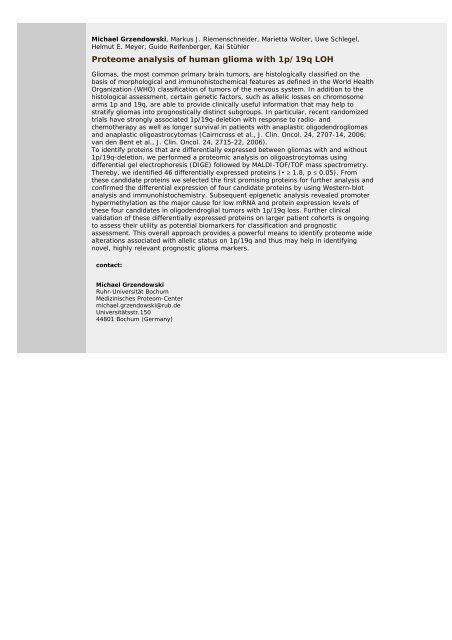Abstracts (poster) - Wissenschaft Online
Abstracts (poster) - Wissenschaft Online
Abstracts (poster) - Wissenschaft Online
You also want an ePaper? Increase the reach of your titles
YUMPU automatically turns print PDFs into web optimized ePapers that Google loves.
Michael Grzendowski, Markus J. Riemenschneider, Marietta Wolter, Uwe Schlegel,<br />
Helmut E. Meyer, Guido Reifenberger, Kai Stühler<br />
Proteome analysis of human glioma with 1p/19q LOH<br />
Gliomas, the most common primary brain tumors, are histologically classified on the<br />
basis of morphological and immunohistochemical features as defined in the World Health<br />
Organization (WHO) classification of tumors of the nervous system. In addition to the<br />
histological assessment, certain genetic factors, such as allelic losses on chromosome<br />
arms 1p and 19q, are able to provide clinically useful information that may help to<br />
stratify gliomas into prognostically distinct subgroups. In particular, recent randomized<br />
trials have strongly associated 1p/19q-deletion with response to radio- and<br />
chemotherapy as well as longer survival in patients with anaplastic oligodendrogliomas<br />
and anaplastic oligoastrocytomas (Cairncross et al., J. Clin. Oncol. 24, 2707-14, 2006;<br />
van den Bent et al., J. Clin. Oncol. 24, 2715-22, 2006).<br />
To identify proteins that are differentially expressed between gliomas with and without<br />
1p/19q-deletion, we performed a proteomic analysis on oligoastrocytomas using<br />
differential gel electrophoresis (DIGE) followed by MALDI-TOF/TOF mass spectrometry.<br />
Thereby, we identified 46 differentially expressed proteins (• ≥ 1.8, p ≤ 0.05). From<br />
these candidate proteins we selected the first promising proteins for further analysis and<br />
confirmed the differential expression of four candidate proteins by using Western-blot<br />
analysis and immunohistochemistry. Subsequent epigenetic analysis revealed promoter<br />
hypermethylation as the major cause for low mRNA and protein expression levels of<br />
these four candidates in oligodendroglial tumors with 1p/19q loss. Further clinical<br />
validation of these differentially expressed proteins on larger patient cohorts is ongoing<br />
to assess their utility as potential biomarkers for classification and prognostic<br />
assessment. This overall approach provides a powerful means to identify proteome wide<br />
alterations associated with allelic status on 1p/19q and thus may help in identifying<br />
novel, highly relevant prognostic glioma markers.<br />
contact:<br />
Michael Grzendowski<br />
Ruhr-Universität Bochum<br />
Medizinisches Proteom-Center<br />
michael.grzendowski@rub.de<br />
Universitätsstr.150<br />
44801 Bochum (Germany)

















